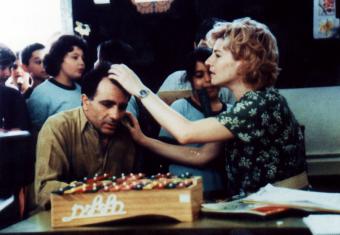 |
YOM
YOM
Tag für Tag
Day after Day
Amos Gitai
Israel 1998
Produktion:
Agav Films, Cinema Factory
Weltvertrieb: Jane Balfour Films Ltd. Burghley House, 35 Fortess Road,
London NW5 1AQ
Tel. (44-171) 26 75 392, Fax 26 74 241
Buch:
Jacky Cukier, Amos Gitai
Kamera: Renato Berta
Ausstattung: Thierry François
Musik: Philippe Eidel, Josef Bradanaschwilli�
Schnitt: Nili Richter, Ruben Kornfeld
Darsteller: Moshe Ivgi, Hanna Maron, Yussef Abu Warda, Dalit Kahan
Sprache: Hebräisch und Arabisch
Format:
35mm, 1:1.85, Farbe Länge: 97 Minuten
|
|
Eine Familie in Haifa, im Mittelpunkt Moshe, ein etwa vierzigjähriger
Hypochonder, der in der Bäckerei seiner Eltern arbeitet. Er ist mehr
oder weniger glücklich mit Didi verheiratet, hat eine Affäre
mit Grischa und eine Schwäche für seine Ärztin, Dr. Perrier.
Seinen Freund Jule hat er in seine intimsten Geheimnisse, inklusive das
Chaos in seinem Leben und seine panische Angst vor dem Tod, eingeweiht.
Dabei weiß er allerdings nicht, daß er und Jule eine Affäre
mit ein und derselben Frau haben. Wie viele komische Helden hat Moshe
auch das Problem des Überlebens. Seine Mutter nennt ihn Moshe, sein
Vater Mussa, alle anderen Mosh. Es ist kein Wunder, daß er nicht
weiß, wer er eigentlich ist und wohin sein Leben ihn führt.
Er ist Teil einer binationalen Familie. Sein Vater Yussef, israelisch-arabischer
Herkunft, steckt in einer Zwangslage: Soll er das letzte Stück Land,
das seiner Familie gehört, verkaufen und damit das Haus seiner Eltern
aufgeben, damit ein supermodernes israelisches Einkaufszentrum gebaut
werden kann? Hanna, die Mutter, fühlt sich immer noch verpflichtet,
Ordnung und Vernunft in das Leben ihres Sohnes, Moshe-Mussa, zu bringen.
In der Mitte dieses Kaleidoskops vielfältiger Beziehungen befindet
sich Mimi, Hannas Nichte, eine Verkehrspolizistin. Sie verfolgt den Verlauf
der Geschichte auf großen Monitoren, ist gleichzeitig Akteurin des
Films und seine erste Zuschauerin. |
Day after Day tells the story
of a family in Haifa. The film observes with irony the almost absurd
situations in which the principle characters find themselves interwoven
like pieces of a puzzle. At the centre of the story we find Moshe, a
hypochondriac in his forties who works in the family bakery. He is married,
more or less happily, to Didi, is having an affair with Grisha and fantasizes
about his doctor, Catherine Perrier. With his childhood friend, Jule,
he shares his most intimate secrets, including the chaos in his life
and an obsessive fear of death. Moshe does not know that they also share
the same woman. Moshe’s parents, Hanna and Yussef have founded
a binational family. Yussef is an Israeli-Arab and is facing a true
dilemma: Should he sell the last family plot of land, the one that his
parents house is build on, in order to make room for a super-modern
Israeli shopping centre? Hanna, meanwhile, still feels obliged to bring
some order and reason into the life of her son, Moshe-Mussa. Moshe,
like all comic heroes, has a problem: survival. His mother calls him
Moshe, his father Mussa and others call him Mosh. It is no surprise
that he does not know who he is and where he is going. The film is constructed
like a mirror-gallery that reflects the daily reality of the city of
Haifa. At the centre of the kaleidoscope, we find Mimi, Hanna’s
niece, an urban traffic controller who observes the unfolding of the
story on large screens. She is simultaneously a character in the film
and its first spectator.
|
Biofilmographie
/ Biofilmography
Amos Gitai wurde am 11. Oktober 1950 in Haifa geboren. Von
1971 bis 1975 studierte er Architektur am Technikon in Haifa, ab 1976
an der University of Southern California in Berkeley, wo er 1986 promovierte.
1973 entstanden seine ersten Super-8-Filme. Im gleichen Jahr nahm er am
Yom-Kippur-Krieg teil und wurde verwundet. 1977 begann er für das
israelische Fernsehen zu arbeiten. Nachdem zwei seiner Filme wegen ihrer
pro-palästinensischen Haltung nicht im israelischen Fernsehen ausgestrahlt
wurden und andere seiner Israel-kritischen Arbeiten angefeindet wurden,
zog er 1982 nach Paris. Seit 1993 lebt Amos Gitai wieder in Israel.
Amos Gitai was born on October 11th, 1950 in Haifa. Between
1971 and 1975 he studied architecture in Haifa, and from 1976 he was enrolled
at the University of California, Berkeley where he received his Ph.D.
in 1986. In 1973 he made his first super-8 films. In the same year he
fought and was injured in the Yom Kippur war. In 1977 he began to work
for Israeli television. After two of his films were not broadcast on Israeli
television because of their pro-Palestinian attitude, and after he was
attacked for being critical of the Israeli point of view, he moved to
Paris in 1982. In 1993 Amos Gitai moved back to Israel.
Films / Filme
1973: Arts and Crafts and Technology; Details of Architecture; Talking
about Ecology. 1974: Ahare (After); 1976: Charisma. 1977: Dimitri; Political
Myths. 1978: Wadi Rushmia; Architecture. 1979: Meoraot Wadi Salib (Wadi
Salib Riots). 1980: Cultural Celebrities; Bait (House) (Forum 1982). 1981:
Wadi (Forum 1982); In Search of Identity; American Mythologies. 1982:
Yoman sade (Field Diary). 1983: Ananas. 1984: Travail a vendre (Bangkok-Bahrein).
1985: Esther (Forum 1992). 1987: Brand New Day. 1989: Berlin-Jerusalem
(Forum 1992). 1990: Naissance d'un Golem. 1991: Golem, l'Esprit de l'Exil
(Forum 1992); Wadi, 10 ans après (Forum 1992). 1992: Mètamorphose
d'une Mèlodie. 1993: Queen Mary; Jardin petrifiè; La guerre
des fils de lumière contre les films des tènébres;
Dans la vallèe de la Wupper (Forum 1994). 1994: Au nom du Duce;
Give Peace a Chance. 1995: Devarim. 1996: L'aréne du meurtre. 1996:
Milim. 1997: Guerre et Paix à Vesoul; Kippour. 1998: Une Maison
à JÚrusalem; YOM YOM. |